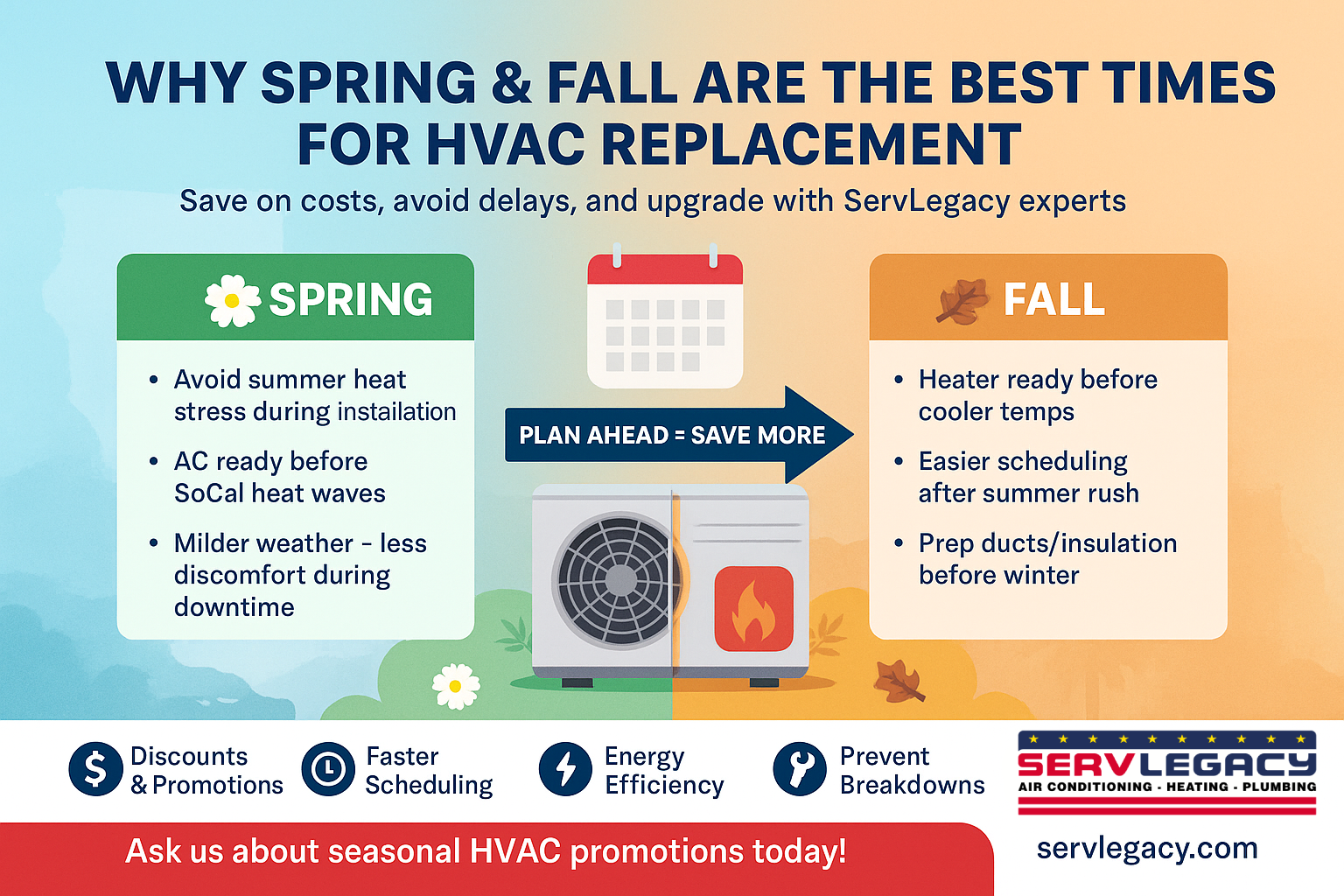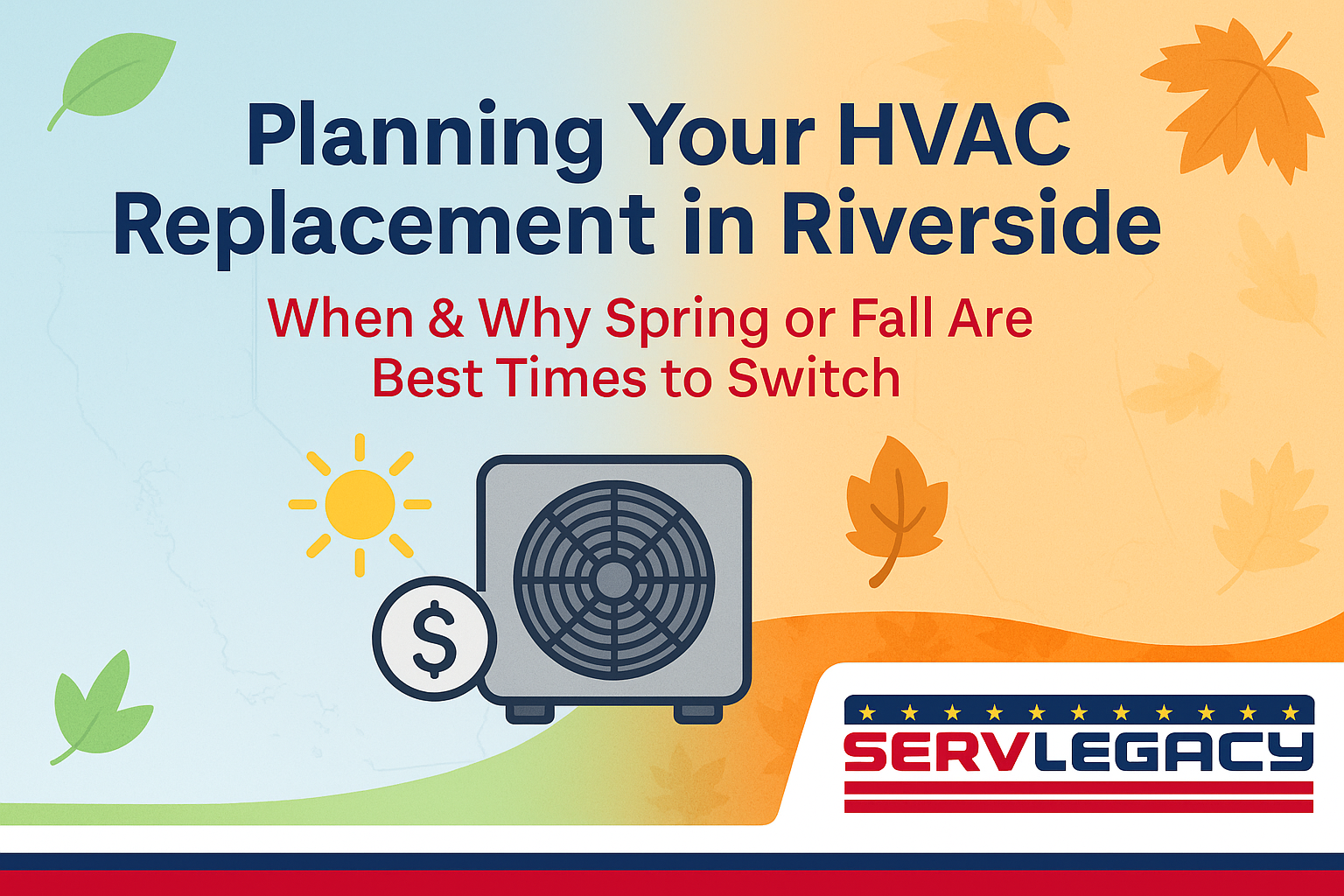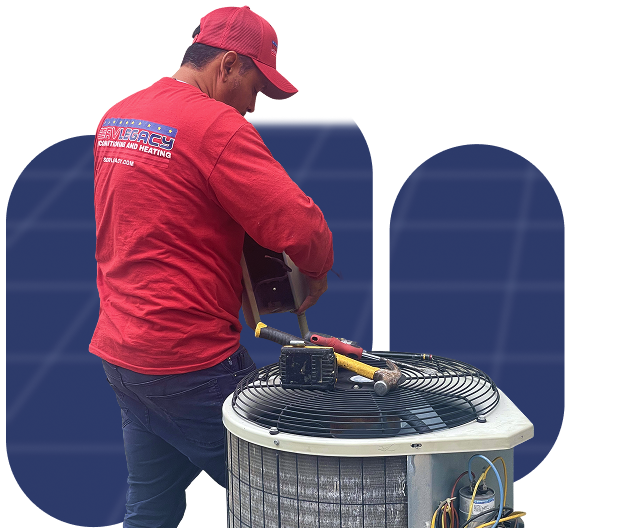Why Spring and Fall are Ideal for HVAC Replacement in SoCal
As they say, timing is everything. Such is true when replacing your HVAC system. Doing so at the right time can reduce stress and costs. While contractors install heating and cooling equipment year-round, not every season is ideal.
When you choose to upgrade your air conditioner and furnace is an important consideration. We’ll explore the various reasons to schedule an off-season HVAC replacement.
Off-Season Scheduling Means Faster and More Flexible Appointments
Summer and winter are the busiest times for HVAC installation and replacement professionals. The availability of contractors can be an issue, making it difficult to get a timely appointment. Technicians are often out on emergency calls, whether performing urgent repairs or installing new systems to ensure Riverside residents stay safe and comfortable.
Timing your HVAC upgrade for the off-season means you can:
- More quickly get a technician to evaluate your home and install equipment.
- Choose the time or day of the week the contractor visits.
- Avoid conflicting with your work schedule and other commitments.
Spring Replacements Keep You Comfortable Before Summer Heat
An AC replacement in the spring ensures you have an air conditioner to rely on in the Southern California heat. During milder weather, you’re less likely to need cooling. Therefore, the temporary lack of air conditioning during installation shouldn’t affect your routine or well-being.
When a professional installs your new system, it will run at peak performance from the start of summer and should remain that way all season. There won’t be any gaps in comfort or energy efficiency.
Fall Installations Ensure Warmth Ahead of Cool Weather
Replacing your furnace in the fall is also a good idea. Contractors are more readily available after the peak summer demand and are not yet busy servicing heating equipment. Installing your new heater now avoids being without heating when it’s essential for your comfort.
Winter isn’t far off, and you won’t have to worry about freezing weather, high demand, and other complications. Also, a professional can help prepare your home for winter by helping seal air ducts and improve insulation.
Take Advantage of Spring and Fall Pricing and Promotions
Waiting for the time between peak seasons has many advantages. Financial incentives are one of them. An off-season HVAC replacement equals cost savings for the following reasons:
- Discount Pricing: Facing lower demand, contractors may offer discounts on cooling and heating equipment during the off-season.
- Reduced Labor Rates: HVAC companies may lower their labor rates to give customers an incentive to consider installing a new system.
- Lower Prices on High-End Equipment: Contractors often reduce prices to get rid of the prior year’s models, which can allow you to invest in a higher-quality unit.
- Rebates: Manufacturers sometimes launch rebate programs during off-seasons to increase demand for equipment that’s in their inventories.
Avoid Peak-Season Delays and Higher Costs
You have more control over the HVAC replacement experience than you might think. Getting an air conditioning or heating contractor to your home for a consultation during peak season can be tough. But delays and cancellations are avoidable by timing your HVAC upgrade wisely.

Surprises with pricing can also be avoided. Discounts and promotions can help you save, too, but aren’t the only opportunities. Emergency service costs, which can be quite high during peak demand, are eliminated. And, replacing outdated, inefficient equipment that may use banned R-22 refrigerant and hard-to-find parts can save you on energy and repair costs.
Plan Ahead and Prevent Breakdowns
Replacing an HVAC system can take a few days. Planning enables you to work with your contractor to find the best time to complete the project. It also helps you to be diligent with the following steps:
- Research the best type and right-sized air conditioner/heater for your home.
- Choose a local, reputable contractor known for great service and competitive pricing.
- Schedule a professional assessment to find a system to meet your heating/cooling needs.
- Find a more efficient system to maximize savings on energy costs.
- Prepare for extreme weather, like heat waves and cooler temperatures.
- Avoid a breakdown that can affect your comfort, safety, and schedule.
- Clean the work area, make arrangements with family members and pets, and otherwise prepare your home.
Planning ahead also helps with budgeting. You are in a better position to decide what you can afford. Aside from finding lower HVAC replacement prices, you can more carefully explore your financing options, which your contractor can help with. Therefore, you can pay in affordable monthly installments and benefit from incentives like low interest rates.
You should also consider the timing of your HVAC system upgrade based on these factors:
- System Age: A heating and cooling system over 15 years old should be replaced before it fails.
- Frequent Repairs: An AC or furnace replacement can be less costly than paying for one repair after another.
- Energy Efficiency: An aging system can increase utility costs; modern HVAC units are more energy efficient and can save on your electric bill.
Save on Energy Bills from Day One with a New Efficient System
Energy efficiency standards have changed. A modern air conditioner or heat pump has a higher Seasonal Energy Efficiency Ratio (SEER) than an older unit, so it provides the same amount of cooling while using less energy. Meanwhile, a new furnace has a better Annual Fuel Utilization Efficiency (AFUE) rating, wasting less fuel to produce heat.
Eco-friendly refrigerants, variable-speed compressors and fans, and smart thermostats also help improve efficiency and lower your energy bills. Plus, you can save even more on utilities by investing in zoning technology (and have the desired amount of heating or cooling for specific parts of your home). Advanced built-in air purification and filtration systems, which improve temperature control and indoor air quality, help as well.
Local Weather and Market Conditions in Riverside That Affect HVAC Timing
The Riverside area has a semi-arid, Mediterranean climate. Summers are warm and dry, and winters are typically mild and wet. The warmer months tend to be very hot, which can strain air conditioning systems. Dry conditions can also cause your HVAC system to work harder, whether it’s providing heating or cooling, resulting in increased wear and tear.
When there’s less moisture, an air conditioner can overcool your home. In winter, a heating system may run longer to maintain the desired level of warmth, as dry air holds heat less effectively. In either case, energy consumption increases. Therefore, it’s important to schedule maintenance in the spring or fall, and consider AC replacement ideally between March and May, and furnace replacement in October or November.
Other reasons to schedule HVAC replacement at the right time include the following considerations:
- High temperatures can last for extended periods.
- Seasonal dust can put extra strain on your HVAC system.
- Compliance with California’s tight energy efficiency standards.
Save on HVAC Replacement. Contact ServLegacy Today
At ServLegacy, we’re here to help find the best, most-efficient heating and cooling system for your home. We’re known for 5-star service from certified technicians who ensure your satisfaction, no matter the season. Continue browsing to learn more about us and how to find the right air conditioning system, or contact ServLegacy about HVAC seasonal promotions and upgrades.


